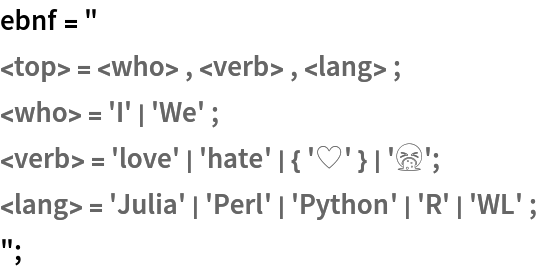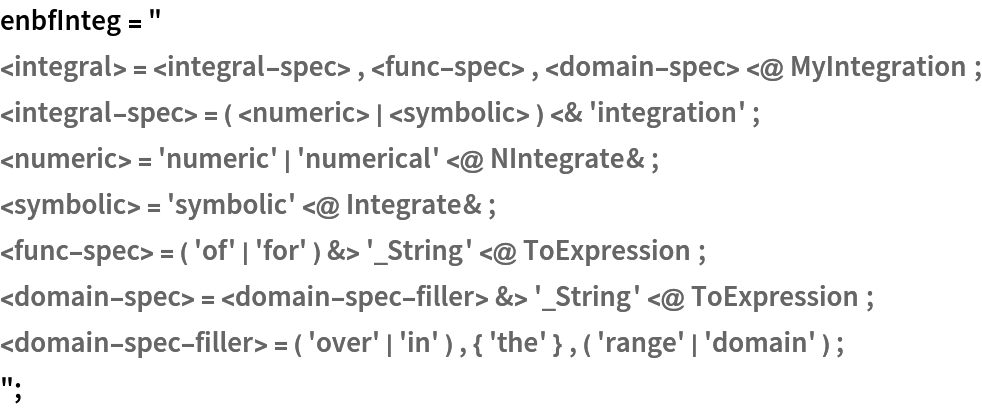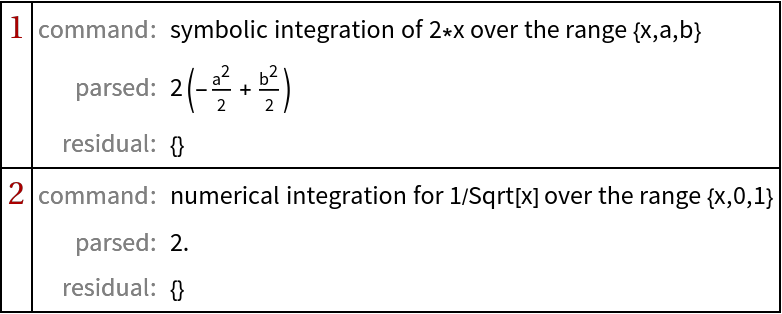Wolfram Language Paclet Repository
Community-contributed installable additions to the Wolfram Language
Functional parsers
Contributed by: Anton Antonov
This paclet provides a complete set of functional parsers and automatic parser generation from grammar specifications in Extended Backus-Naur Form.

To install this paclet in your Wolfram Language environment,
evaluate this code:
PacletInstall["AntonAntonov/FunctionalParsers"]
To load the code after installation, evaluate this code:
Needs["AntonAntonov`FunctionalParsers`"]
Here is an EBNF grammar:
| In[1]:= |  |
Here we generate random sentences with the grammar above:
| In[2]:= |
| Out[3]= |  |
Make a parser for a family of (two) simple sentences:
| In[4]:= |
Here we parse a sentence adhering to the grammar of the defined parser:
| In[5]:= |
| Out[5]= |
Here we parse the other sentence of that grammar:
| In[6]:= |
| Out[6]= |
These sentences are not be parsed:
| In[7]:= |
| Out[7]= |
Here is another parser over longer, more complete integration sentences:
| In[8]:= | ![(* Evaluate this cell to get the example input *) CloudGet["https://www.wolframcloud.com/obj/09fdf177-e64b-4c21-97de-77b681de3063"]](https://www.wolframcloud.com/obj/resourcesystem/images/db9/db90adfe-0dd8-42ed-bc35-db5c8b2cf9d5/3e0262574fc931ae.png) |
Here we parse a sentence (adhering to the grammar of the defined parser):
| In[9]:= |
| Out[9]= |
Here is another parsing:
| In[10]:= |
| Out[10]= |
Rewrite the parser above with suitable interpretation:
| In[11]:= | ![(* Evaluate this cell to get the example input *) CloudGet["https://www.wolframcloud.com/obj/088c7c04-07da-46b1-a7df-39f8cccb688b"]](https://www.wolframcloud.com/obj/resourcesystem/images/db9/db90adfe-0dd8-42ed-bc35-db5c8b2cf9d5/5d2b7e5e359a4ac2.png) |
Here we parse a numerical integration command:
| In[12]:= |
| Out[12]= |
Here we parse a symbolic integration command:
| In[13]:= |
| Out[13]= |
It is much easier to follow the parser and interpreter specification using Extended Backus-Naur Form (EBNF):
| In[14]:= |  |
Here we generate random sentences with the grammar string above:
| In[15]:= |
| Out[16]= |  |
Here we generate the parsers:
| In[17]:= |
Here we parse -- and interpret -- integration commands:
| In[18]:= | ![commands =
{"symbolic integration of 2*x over the range {x,a,b}",
"numerical integration for 1/Sqrt[x] over the range {x,0,1}"};
Block[{MyIntegration = #[[1]] @@ #[[2]] &},
InterpretationBox[FrameBox[TagBox[TooltipBox[PaneBox[GridBox[List[List[GraphicsBox[List[Thickness[0.0025`], List[FaceForm[List[RGBColor[0.9607843137254902`, 0.5058823529411764`, 0.19607843137254902`], Opacity[1.`]]], FilledCurveBox[List[List[List[0, 2, 0], List[0, 1, 0], List[0, 1, 0], List[0, 1, 0], List[0, 1, 0]], List[List[0, 2, 0], List[0, 1, 0], List[0, 1, 0], List[0, 1, 0], List[0, 1, 0]], List[List[0, 2, 0], List[0, 1, 0], List[0, 1, 0], List[0, 1, 0], List[0, 1, 0], List[0, 1, 0]], List[List[0, 2, 0], List[1, 3, 3], List[0, 1, 0], List[1, 3, 3], List[0, 1, 0], List[1, 3, 3], List[0, 1, 0], List[1, 3, 3], List[1, 3, 3], List[0, 1, 0], List[1, 3, 3], List[0, 1, 0], List[1, 3, 3]]], List[List[List[205.`, 22.863691329956055`], List[205.`, 212.31669425964355`], List[246.01799774169922`, 235.99870109558105`], List[369.0710144042969`, 307.0436840057373`], List[369.0710144042969`, 117.59068870544434`], List[205.`, 22.863691329956055`]], List[List[30.928985595703125`, 307.0436840057373`], List[153.98200225830078`, 235.99870109558105`], List[195.`, 212.31669425964355`], List[195.`, 22.863691329956055`], List[30.928985595703125`, 117.59068870544434`], List[30.928985595703125`, 307.0436840057373`]], List[List[200.`, 410.42970085144043`], List[364.0710144042969`, 315.7036876678467`], List[241.01799774169922`, 244.65868949890137`], List[200.`, 220.97669792175293`], List[158.98200225830078`, 244.65868949890137`], List[35.928985595703125`, 315.7036876678467`], List[200.`, 410.42970085144043`]], List[List[376.5710144042969`, 320.03370475769043`], List[202.5`, 420.53370475769043`], List[200.95300006866455`, 421.42667961120605`], List[199.04699993133545`, 421.42667961120605`], List[197.5`, 420.53370475769043`], List[23.428985595703125`, 320.03370475769043`], List[21.882003784179688`, 319.1406993865967`], List[20.928985595703125`, 317.4896984100342`], List[20.928985595703125`, 315.7036876678467`], List[20.928985595703125`, 114.70369529724121`], List[20.928985595703125`, 112.91769218444824`], List[21.882003784179688`, 111.26669120788574`], List[23.428985595703125`, 110.37369346618652`], List[197.5`, 9.87369155883789`], List[198.27300024032593`, 9.426692008972168`], List[199.13700008392334`, 9.203690528869629`], List[200.`, 9.203690528869629`], List[200.86299991607666`, 9.203690528869629`], List[201.72699999809265`, 9.426692008972168`], List[202.5`, 9.87369155883789`], List[376.5710144042969`, 110.37369346618652`], List[378.1179962158203`, 111.26669120788574`], List[379.0710144042969`, 112.91769218444824`], List[379.0710144042969`, 114.70369529724121`], List[379.0710144042969`, 315.7036876678467`], List[379.0710144042969`, 317.4896984100342`], List[378.1179962158203`, 319.1406993865967`], List[376.5710144042969`, 320.03370475769043`]]]]], List[FaceForm[List[RGBColor[0.5529411764705883`, 0.6745098039215687`, 0.8117647058823529`], Opacity[1.`]]], FilledCurveBox[List[List[List[0, 2, 0], List[0, 1, 0], List[0, 1, 0], List[0, 1, 0]]], List[List[List[44.92900085449219`, 282.59088134765625`], List[181.00001525878906`, 204.0298843383789`], List[181.00001525878906`, 46.90887451171875`], List[44.92900085449219`, 125.46986389160156`], List[44.92900085449219`, 282.59088134765625`]]]]], List[FaceForm[List[RGBColor[0.6627450980392157`, 0.803921568627451`, 0.5686274509803921`], Opacity[1.`]]], FilledCurveBox[List[List[List[0, 2, 0], List[0, 1, 0], List[0, 1, 0], List[0, 1, 0]]], List[List[List[355.0710144042969`, 282.59088134765625`], List[355.0710144042969`, 125.46986389160156`], List[219.`, 46.90887451171875`], List[219.`, 204.0298843383789`], List[355.0710144042969`, 282.59088134765625`]]]]], List[FaceForm[List[RGBColor[0.6901960784313725`, 0.5882352941176471`, 0.8117647058823529`], Opacity[1.`]]], FilledCurveBox[List[List[List[0, 2, 0], List[0, 1, 0], List[0, 1, 0], List[0, 1, 0]]], List[List[List[200.`, 394.0606994628906`], List[336.0710144042969`, 315.4997024536133`], List[200.`, 236.93968200683594`], List[63.928985595703125`, 315.4997024536133`], List[200.`, 394.0606994628906`]]]]]], List[Rule[BaselinePosition, Scaled[0.15`]], Rule[ImageSize, 10], Rule[ImageSize, 15]]], StyleBox[RowBox[List["ParsingTestTable", " "]], Rule[ShowAutoStyles, False], Rule[ShowStringCharacters, False], Rule[FontSize, Times[0.9`, Inherited]], Rule[FontColor, GrayLevel[0.1`]]]]], Rule[GridBoxSpacings, List[Rule["Columns", List[List[0.25`]]]]]], Rule[Alignment, List[Left, Baseline]], Rule[BaselinePosition, Baseline], Rule[FrameMargins, List[List[3, 0], List[0, 0]]], Rule[BaseStyle, List[Rule[LineSpacing, List[0, 0]], Rule[LineBreakWithin, False]]]], RowBox[List["PacletSymbol", "[", RowBox[List["\"AntonAntonov/FunctionalParsers\"", ",", "\"AntonAntonov`FunctionalParsers`ParsingTestTable\""]], "]"]], Rule[TooltipStyle, List[Rule[ShowAutoStyles, True], Rule[ShowStringCharacters, True]]]], Function[Annotation[Slot[1], Style[Defer[PacletSymbol["AntonAntonov/FunctionalParsers", "AntonAntonov`FunctionalParsers`ParsingTestTable"]], Rule[ShowStringCharacters, True]], "Tooltip"]]], Rule[Background, RGBColor[0.968`, 0.976`, 0.984`]], Rule[BaselinePosition, Baseline], Rule[DefaultBaseStyle, List[]], Rule[FrameMargins, List[List[0, 0], List[1, 1]]], Rule[FrameStyle, RGBColor[0.831`, 0.847`, 0.85`]], Rule[RoundingRadius, 4]], PacletSymbol["AntonAntonov/FunctionalParsers", "AntonAntonov`FunctionalParsers`ParsingTestTable"], Rule[Selectable, False], Rule[SelectWithContents, True], Rule[BoxID, "PacletSymbolBox"]][pINTEGRAL, commands, "Layout" -> "Vertical"]
]](https://www.wolframcloud.com/obj/resourcesystem/images/db9/db90adfe-0dd8-42ed-bc35-db5c8b2cf9d5/2cb582bbaaeffc05.png) |
| Out[19]= |  |